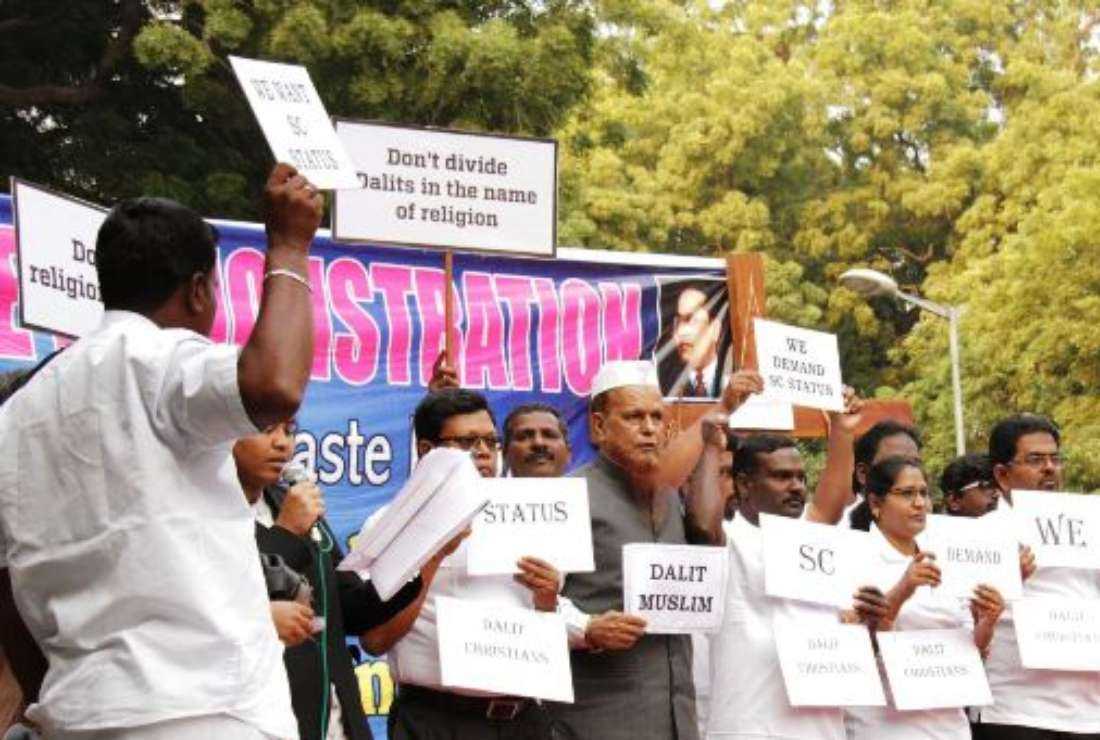India alludes to ‘foreign origins’ of Christianity, Islam
Community leaders see a ploy to deny educational and job quotas for their co-religionists of Dalit origin

India’s Dalit Christians and Muslims shout slogans at a protest to demand education and job quotas under the nation’s reservation policy, in New Delhi on Dec. 4, 2018. (Photo: Bijay Kumar Minj/ UCA News)
Christian and Muslim leaders in India have expressed disappointment after the federal government cited the “foreign origins” of their faiths as justification for denying them the benefits of its affirmative action policy.
The affidavit filed through the Ministry of Social Justice and Empowerment before the Supreme Court in October defends the current criteria for determining which communities can be classified as Scheduled Castes (SC) and hence eligible for quotas in education and jobs as part of the constitution-approved policy of reservations.
There was “intelligible differentia” between Dalits practicing Hinduism, Sikhism, and Buddhism and those following other religions, the affidavit states.
The Hindu newspaper reported this as “possibly pointing to the argument that Christianity and Islam are not Indic religions and that there were foreign contributions to the creation of Christian and Muslim populations in India.”
“It is not clear though, whether this was done deliberately”
J. George, a member of the National Council of Dalit Christians and one of the petitioners in the case, said “it was a matter of concern” because the federal government’s stance could delay the granting of SC status to Christians and Muslims of Dalit origin.
“It is not clear though, whether this was done deliberately or unknowingly,” he added.
Mohammad Salim Engineer, secretary-general of Jamaat-e-Islami Hind, a Muslim socio-religious group, said the Indian Constitution grants every citizen the right to choose any religion and this affidavit contradicted this basic principle.
He hoped the government would rethink its stance and ensure equal treatment for all.
“We hope our Dalit brothers and sisters will not be deprived of the benefits of reservation simply because they became Christians or Muslims,” he said.
Father Z. Devasagaya Raj, former secretary of the Catholic Bishops’ Conference of India’s Office of Dalits and Backward Classes, said Dalits are treated as untouchables even today regardless of their religion, Indic or foreign.
“Caste-based discrimination has become part and parcel of Indian society”
“The indelible stigma of untouchability continues to haunt them in their everyday lives as several academic studies and official commission reports have proved in the past,” the priest told UCA News on Nov 9.
Though the origin of castes is traced to the Hindu religion, it is wrong to connect the discriminatory practices associated with it only with Indic religions.
“The practice of caste-based discrimination has become part and parcel of Indian society, irrespective of religion,” he explained.
The benefits of the reservation policy are currently available for Hindus, Buddhists and Sikhs of Dalit origin while Christians and Muslims have been seeking them for many years.
Successive governments have appointed commissions to study the issue but continue to deny the reservation benefits despite recommendations that Dalit Christians and Dalit Muslims should be included on the SC list.
The word Dalit means “trampled upon” in Sanskrit and refers to all groups once considered untouchable and outside the four-tier Hindu caste system.
Government data shows some 201 million of India’s 1.2 billion-plus people are Dalits, many having converted to Christianity and Islam over the decades to escape caste-based discrimination.
Some 60 percent of India’s 25 million Christians are believed to be of Dalit or tribal origin.




